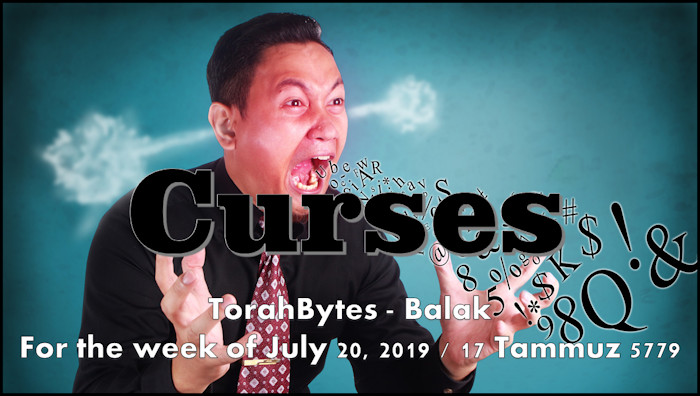For the week of July 20, 2019 / 17 Tammuz 5779
Balak
Torah: B’midbar/Numbers 22:2 – 25:9
Haftarah: Micah 5:6 – 6:8 (English 5:7 – 6:8)
Download Audio [Right click link to download]
Behold, a people has come out of Egypt. They cover the face of the earth, and they are dwelling opposite me. Come now, curse this people for me, since they are too mighty for me. Perhaps I shall be able to defeat them and drive them from the land, for I know that he whom you bless is blessed, and he whom you curse is cursed. (B’midbar/Numbers 22:5-6)
Do you think of the people of Bible times as fundamentally superstitious? Merriam-Webster online defines “superstition” as “a belief or practice resulting from ignorance, fear of the unknown, trust in magic or chance, or a false conception of causation.” It seems to me that “false conception of causation” really captures it. The superstitious person acts upon a belief that certain happenings occur because of certain other things even though there is no reliable evidence that there is an actual connection between the two. For example, when I was about eleven years old, I was eating lunch at home and somehow dropped my salmon sandwich on the floor. At the time, I thought nothing of it, picked it up, and ate it. By that evening I was sick with a stomach virus. It would be years before I would eat salmon again. Yet even if that which made me sick transferred from the floor to the sandwich to my stomach, which is highly unlikely, there is no reason to think that all salmon from that moment on was a potential threat to my health. I do eat salmon now, but I would be lying if I said, I don’t have to fight through at least a tinge of unreasonable fear to do so. I could be wrong, but it seems to me that “false conception of causation” like this is pretty common. Maybe not you, of course.
In spite of human propensity towards superstition, we tend to think of ancient folks as more superstitious than we are. This is how we would view the story of Balak and Bilam (English: Balaam). Balak was a Moabite king who felt threatened by the presence of the people of Israel. Thinking they were no match for them militarily, he wanted to hire Bilam, a diviner of some sort, to curse them. Balak believed that by Bilam’s pronouncing certain words, Israel’s defenses would be weakened. As it turned out, God stepped in and didn’t allow Bilam to curse Israel. Every time he prepared to recite his incantations, he blessed Israel instead.
I suspect that even Bible fans regard this scene as reflective of a superstitious culture. What difference would it have made if Bilam had cursed Israel anyway? Would God have allowed words of destruction toward his chosen people to have any effect? Do such words have any effect regardless? Isn’t this a case of “false conception of causation”? It’s a great story for ancient people, but we know better than to give any credence to such a worldview, right?
I could spend the time remaining exploring the power of words. So much can be said about words, pun intended. From God’s using words to create the universe to the difference words make in our personal lives, a case could be made for causation with regard to blessings and curses, however the mechanics might work. But instead of analyzing the legitimacy of the power of blessing and curses, I would rather look at a contemporary parallel to the Balak and Bilam story.
When Balak determined that his people’s normal military prowess would be insufficient, he resorted to cursing. Whatever he believed about its dynamics, he thought it would work. In this case, his plan backfired, but that’s not stopping many people today from following his example.
In our increasingly polarized culture, more and more people are resorting to cursing those with whom they disagree. Instead of engaging differences by providing intelligent reasons for a particular viewpoint, it is common to tear the other party down with insults, accusations, and insinuations. Often people are shamed publicly, held up to incessant mockery, and subject to death wishes.
It should be clear that like Balak, these verbal attacks are happening because people really believe they work. We could wish that falsehood when spoken evaporates into the air, but it doesn’t. Negative words potentially destroy lives. The causal relationship between the curses (or whatever you want to call them) and their devastating effects doesn’t matter as much as that it works.
I wonder how many of us are not standing for what is good and right today, because we are afraid of the potential curses we may have to endure. But let’s remember that if we are truly in the Messiah, then like Israel of old, we can be confident that God will not allow negative verbal assaults to have their way in our lives. As we read in Mishlei, the book of Proverbs: “Like a sparrow in its flitting, like a swallow in its flying, a curse that is causeless does not alight” (Mishlei/Proverbs 26:2).
Scriptures taken from the English Standard Version

Well said, Alan. Thank you for sharing these insights. I totally agree with you on this. Blessings to you.